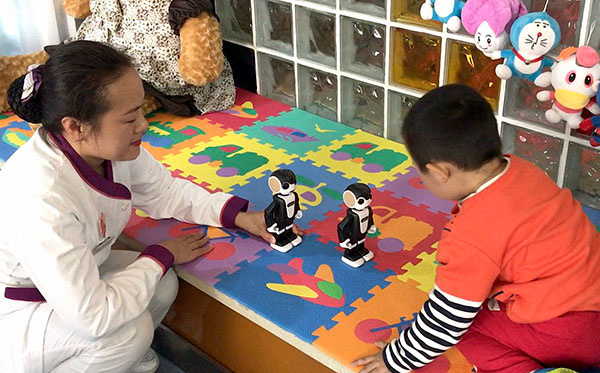By Tom McGregor, CCTV.com Panview commentator and editor
Editor's Note: CCTV.com Panview presents 'China Cares' — series of special coverage on China's rural reforms, charities and comprehensive efforts to help those in poverty unlock their potential for success.
Mental health issues have long been taboo topics for families in China and the surrounding Asia-Pacific. Many Asians believe a person afflicted with mental illness is someone lacking strong willpower to overcome emotional challenges.
Ironically, Asian culture supports science and it's the science of mental disorders that reveal people who have succumbed to a psychosis had no control of it. They were simply sick in the mind on account of an altered brain chemistry or traumatic experiences that had hindered an ability for them to lead normal, healthy and stable lifestyles.
But help is on the way and the Chinese government has taken significant strides to reduce the social stigma of mental illness in the country and make it easier for those afflicted to receive proper treatment.
China's mental health law
At the 18th National People's Congress of the Communist Party of China in 2013, the Central Government had enacted the nation's first mental health care law.
The law gives rights to people with mental illness. The police cannot force an adult person into a psychiatric hospital against their will, unless they pose a threat to themselves or others.
The law can comfort the mentally ill, since some Chinese families were known to call the police to send a relative to a mental hospital if they considered the person a nuisance during family disputes.
Meanwhile, the new law was intended to offer mental health treatment that would be more accessible and humane. The purpose of treatment is to aid the mentally ill so they can restore their dignity and to lead more normal lives.
"We want to bring patients back to society," Dr. Liu Ming, deputy director of First Specialized Hospital of Harbin in northeast China's Heilongjiang province, told Foreign Policy magazine.
In 2015, China's Health Ministry has outlined a goal to double the number of trained psychiatrists and to boost their salaries by 2020.
Making family first
Beijing also set a target for 80 percent of all Chinese with severe mental illness to have access to continuing medical treatment. Yet, there’s not enough beds in mental hospitals nationwide to serve the estimated 8.27 million Chinese who were diagnosed with serious mental disorders in 2016.
Accordingly, mental health professionals are expected to prioritize, by providing in-patient care for those with severe psychosis, while many others with less serious cases can receive out-patient care at psychiatric offices and rehab clinics.
Psychiatrists are encouraging families to play a more effective role as well. Local governments are promoting mental health awareness and advocacy campaigns.
"I believe they (China) really want to improve the living standards of people with mental illnesses," Alessandro Lorato, Assozione Italiana di Raoul Fotterue director of China chapter, told Foreign Policy magazine.
He also added that self-help groups for patients' families can help them learn more about the mental illness, which had afflicted a loved one.
The emphasis on out-patient care makes it easier for patients to readjust back to routine lives when they get better. Families can team up with psychiatrists to ensure that their loved ones stay on course wit the right treatment in the long-term.
Robots help too
Not only families, but robots are expected to play a more crucial role in mental health treatment in the nation. The WomenofChina Website reports that a hospital in northeast China has deployed a team of robots to help autistic children.

(A child with autism interacts with robots at Harbin Children's Hospital, as part of an innovative approach to treatment. Photo from China Daily by Zhou Huiying)
The E-Medical Artificial Intelligence Cognitive Rehabilitation Center at Harbin Children's Hospital received 30 children with autism and 10 robots are providing advanced treatment assistance to them.
Each robot takes the name, RoBoHon, 33-cm. tall and looks like a friendly cartoon character. Mimicking a child’s voice, they sing and engage in simple conversations with patients.
Children with autism, lack social skills to connect with others, which is a neural disorder causing them to act under restricted and repetitive behaviors. The AI robots can encourage such children to open up and talk.
The project has been successful and RoBoHon robots will be further developed for patients to take home to track the child’s health, give reminders to take medicine and provide comfort for lonely kids, while sending medical data to doctors.
Fast-changing world and treatment methods
As the country continues on with its rapid development path, not every person can adapt to the changing times. There might be an increasing number of Chinese people diagnosed with mental illness in the upcoming years.
Nonetheless, the Chinese government has reformed its national mental health care system to provide hope for those who have long been without it. And for families who have a member afflicted with a mental disorder they can receive help too.
People with mental health problems often feel alone, isolated and stigmatized. They don't have to feel that way when family members can show them love and work with health officials to provide the best treatment for their lives.
(The opinions expressed here do not necessarily reflect the opinions of Panview or CCTV.com. )

Panview offers a new window of understanding the world as well as China through the views, opinions, and analysis of experts. We also welcome outside submissions, so feel free to send in your own editorials to "globalopinion@vip.cntv.cn" for consideration.
















